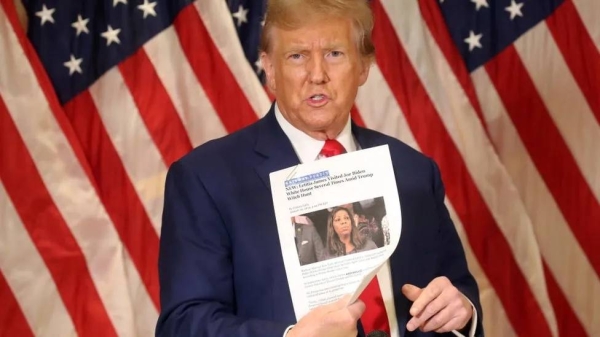
NATO’s 29 heads of state and government, from countries with a collective population of around 1 billion, will meet in Brussels on Wednesday and Thursday for what could prove a historic summit. This will not be primarily due to the important announcements made about the future of the alliance, but because of US President Donald Trump’s potentially disruptive diplomacy at a time of growing Western splits.
The annual summits of one of the world’s most successful military alliances ever — one that has helped underpin the longest period of sustained peace in the West’s modern history — can become key moments in its evolution.
Key among the modernization measures expected to be announced this week include deepening cooperation with the EU, launching a new training mission in Iraq, and extending funding for Afghan forces. Underlying this will be a new military command structure and increased force readiness.
Yet as important as these developments potentially are, much attention will focus squarely on Trump after his recent comments about NATO at last month’s G-7 Summit. Then, he asserted that the military alliance was, for the US, “as bad as the North America Free Trade Agreement (NAFTA),” which he has called “the worst trade deal maybe ever signed anywhere, but certainly ever signed in this country.”
Coming hot on the heels of the G-7 in Canada, when Trump remarkably refused to endorse the end-of-summit communique, there is palpable anxiety that he will once again prove a highly disruptive presence.
What is particularly feared is that he will criticize NATO colleagues, then days later have a cordial meeting with Russian President Vladimir Putin in Helsinki, which could undermine confidence in the transatlantic alliance.
Coming hot on the heels of the G-7 in Canada, there is palpable anxiety that Trump will once again prove a highly disruptive presence at NATO.
Andrew Hammond
In this sense, what is concerning Europe and Canada is a mirror image of what happened after the G7 Summit. Then, after openly lambasting key, longstanding allies, Trump went to the Singapore Summit to heap praise on North Korean leader Kim Jong Un despite little, if any, new concessions from Pyongyang over its nuclear program.
If Trump proves to be in such a mood again, his anger will most likely manifest around the failure of numerous key NATO states to spend more on defense. This list includes Germany and Spain, which currently are not expected by 2024 to deliver on a pledge to meet a target of 2 percent of gross domestic product (GDP) spending on their militaries.
These fractures in the alliance have been exacerbated by a potential trade war on the horizon. In late June, the EU retaliated against the US with tariffs on around $3.3 billion of American products, in response to recent US duties on aluminum and steel.
In the face of these challenges, and conscious that Trump will be seeing Putin soon, most NATO member states will seek to underline the unity of the Western alliance, not least in the face of an emboldened Russia.
There is alarm in certain quarters about the West’s ability to respond to what is perceived as a significantly enhanced Russian security threat. Whereas Russia is estimated to have increased defense spending by some 80 percent between 2008 and 2014, the counterpart figure for NATO countries collectively was a decrease of around 20 percent, although there have been increases in defense spending since then in some European states and Canada, and a significant rise in the US.
This burden-sharing issue has long been a sore spot for the US, which accounts for around two-thirds of total NATO defense spending. For instance, Barack Obama had urged allies during his presidency to meet the target of 2 percent of GDP.
Beyond Russia, there will be another dimension of the attempted showcasing of unity this week: In the wake of the UK’s scheduled departure from the EU in March, most NATO members will be keen to emphasize the unity of the Western alliance.
NATO has cooperated with the EU on a range of security challenges for many years, including currently in the Aegean Sea to help tackle the migrant and refugee crisis. And the two organizations are demonstrating even higher levels of reciprocal cooperation in areas such as hybrid and cyber threats, and increasing maritime security.
Taken overall, the summit will therefore give NATO important strategic direction in a rapidly changing security environment. However, the new measures are unlikely to fully satisfy Trump, who appears to have significant continued concerns about whether the alliance is fit for purpose.
Andrew Hammond is an associate at LSE IDEAS at the London School of Economics.
Disclaimer: Views expressed by writers in this section are their own and do not necessarily reflect Arab News" point-of-view












